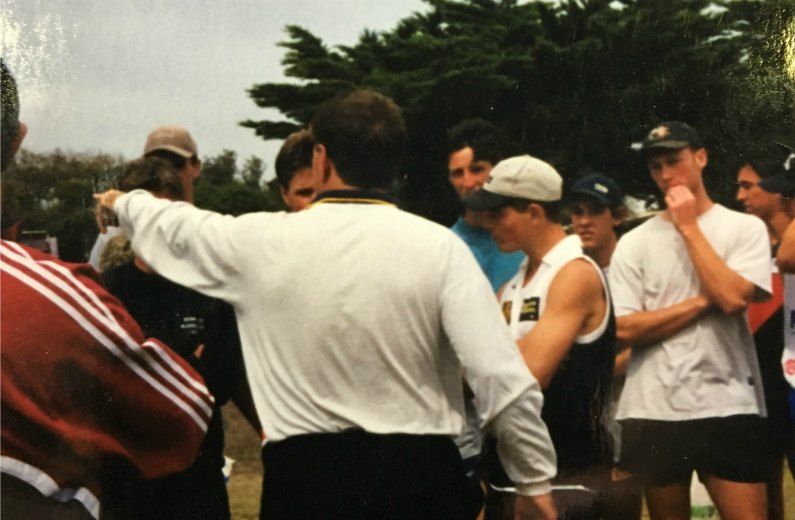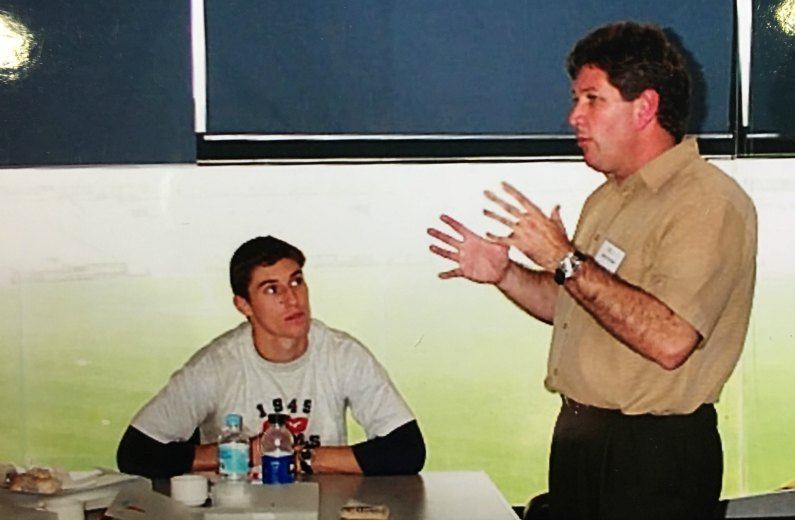Recently I left my home in Geelong for a two-hour drive to Warrnambool to run a team development and leadership session with Warrnambool Football/Netball Club.
In simple terms, the session was about creating a high performing culture and driving success. When I took off down the highway, I realised about 25 years ago, I had been travelling down the highway to run a very similar session with another country football club close to Warrnambool.

Ray training young athletes in the early 2000s
I began to reflect on the significance of doing these sessions 25 years apart and what has changed. I realised that the principles I was about to cover with this team tonight were not significantly different to the ones I was using 25 years ago. The core principles on how to drive a high performing team are still the same.
Define your core values
The key message that I was delivering in this session to this fantastic group of young people, is that in a high performing team we need to come to an agreement around behaviour with one another, in other words some core values for their team. We need to build relationships in the team that are going to be sustainable enough that we can then challenge one another, support one another and meet those values.
The other point which seemed important to me is that the young people sitting in front of me that night were so similar in so many ways to the young people I was dealing with 25 years ago.
Treat people as individuals
I thought of how many problems we have created for ourselves by trying to categorise people by age (or gender, sexuality, or nationality for that matter). We now have Millennials, Y-Generation, X-Generation etc. I think it has made our work with young people more difficult.
I’m never quite sure, but I think I’m a Baby Boomer. Apparently, this can create all sorts of problems when trying to communicate with people from other generations. My secret over the 25 years I have been working at Leading Teams is to simply treat everyone as though they are from the human race.
I always see it as my responsibility to be able to engage with the people I work with respectfully, no matter their ‘category’. That is why I saw little difference between the session I ran 25 years ago, and the one I ran last week.
The future is now
I titled the article, The good old days are here and now because as a much older person I could have gone and presented to this younger group and lamented the fact that things weren’t as good as they were in my day etc.
However, I thought that would be an easy way to have them disengage. I just have to keep reminding myself that their ‘good old days’ are here and now and what they are looking for is very similar in many ways to what I was looking for when I played my sport many years ago. I detected that they still want a sense of belonging, a sense of being able to achieve something with your friends, and sometimes (not always) experiencing some success. Those core principles hold true in my view.
On a separate note, I also reflected on just how much I still love getting in the car and going out to do these sessions. I always leave feeling inspired by the young people of today. I still have great confidence in the young leaders that are coming through our communities. Perhaps as older people it might be good for us to look a little harder to find those positive qualities and remind ourselves that the young people’s ‘good old days’ are here now and our support might make those days even more memorable for them.
Ray founded Leading Teams in 1992 after working as a leadership officer with the Air Force. He has published two books, ‘Any Given Team’ and ‘Team Work’. Ray is based in Geelong.
Learn more about Ray.




